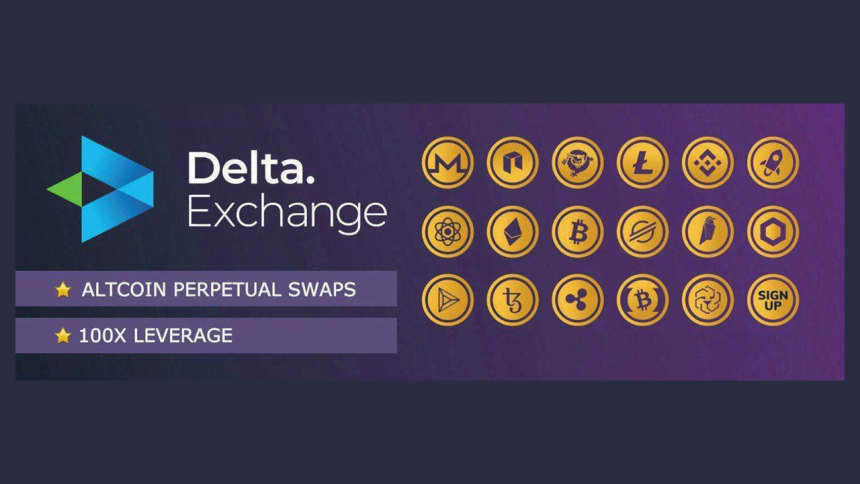From the invention of Bitcoin to the launch of the first crypto exchange to the rise of crypto derivatives, the crypto world has continued to churn out innovative products. And, the best part is that these innovations have the potential to make a significant positive impact on our world.
This phenomenon is exemplified by Binance. Today Binance is the number one crypto exchange, even though it was launched only around two years ago. Binance managed to beat well-entrenched incumbents like Coinbase, Bitfinex and Bittrex through its innovative product and business strategy. When the other exchanges were fixated on Bitcoin and a handful of other crypto assets, Binance championed altcoins trading and stablecoin (USDT) pairs. These innovations immediately resonated with traders.
Now, Delta Exchange has taken a leaf out of Binance’s book to make a dent in BitMex’s hegemony in the crypto derivatives space. BitMex has always been a Bitcoin-focused platform. With the exception of a few, most of the BitMex’s futures contracts are on BTC pairs and are settled in BTC. Newer derivatives exchanges too have adopted BitMex’s well proven approach and have listed futures contracts only on top 10 coins. In contrast, Delta Exchange is betting big on altcoin derivatives.
Delta Exchange: Current Status
Delta currently lists futures and perpetual contracts on 14 cryptocurrencies and crypto-assets. BTC, ETH and XRP are certainly part of this list. But Delta’s USP are buzzy altcoins like BNB, Tezos, Link and ATOM. Several of these altcoins are exclusive to the exchange. This means that Delta Exchange is the only destination for traders looking to long/ short these alts with leverage.
Why Altcoin Derivatives
Binance is the epitome of altcoin trading. During the ICO boom of 2017 and early 2018, exchanges couldn’t list altcoins fast enough. Traders had to maintain accounts on multiple exchanges to get access to their favorite alts. Binance changed this by becoming the one-stop-altcoin-shop. This alone was a strong enough reason for traders to switch to Binance. Delta Exchange believes a similar story is likely to play out in crypto derivatives as the space matures.
That being said, Binance isn’t the key competitor here. Delta Exchange is going head to head with BitMex, the major league exchange for cryptocurrency derivatives. While BitMex is still extremely popular with speculators, it has shown little interest in listing contracts on new coins or launching new products. The listing of EOS futures in August 2018 was the last addition to BitMex’s suite of derivative products.
Where BitMex lags, Delta Exchange succeeds. Delta has been responsive to market situations and traders’ interest in listing perpetuals on altcoins. A prime example of this is the listing of LEO perpetual 3 days after it started trading on Bitfinex. By doing this, Delta was able to provide a quick KYC-less way of trading LEO with leverage.
Thus far, the exchange’s strategy seems to be bearing fruit. Delta Exchange has been able to carve a unique positioning in traders’ minds as the altcoin derivatives house. The exchange is looking to further cement this position by launching other innovative financial products such as options and interest rate derivatives for altcoins.
Delta Exchange: Salient Features
- Alts trading without owning them: The beauty of derivatives is that you can speculate on an asset without actually owning it. In Delta’s case, all its futures and perpetual contracts are margined and settled in BTC or USDC. Thus, a trader needs to have either of the two currencies to bet upon any number of alts.
- No overload problem: Delta has been operation for over a year now. Its trading engine and risk management systems have been battle tested. These systems have behaved remarkably well in volatile market conditions.
- Prompt Customer support: Customer support has been a strong suit of the exchange. Trader queries and issues are promptly resolved. Several customers in their tweet reviews of the exchange have listed good customer support as one of the key positives.
- Robust APIs: While Delta is retail focused exchange, it has not ignored the needs of sophisticated investors that trade programmatically. The exchange has stable, well-designed and well-documented REST and socket APIs.
- Trader focus: The exchange has made it a practice to roll out initiatives and promotions that reward actual traders rather than affiliates. A good example of this is Delta’s 50% fee payback offer. This promotion helps to cut the fee of loyal customers of Delta by half.
Can Delta Exchange Deliver
We believe that there are two things that are going in Delta Exchange’s favor: (a) the right team to build a leading derivatives exchange and (b) proven track record.
The founding team of Delta Exchange is comprised of ex-Wall Street Traders and successful tech entrepreneurs. Two of the three founders have worked with Citigroup and UBS and have deep understanding of derivatives trading. The technical co-founder has built and sold companies that scaled to millions of users.
The exchange has been operational for one year without any hiccups. The trading systems have proven to be resilient to volatile market conditions and have been robust enough to handle leveraged trading of altcoins. More importantly, the team has shown the ability to learn and respond to traders’ demands and feedback. This has enabled them to launch innovative products. If this track record is any indication, the Delta Exchange team should be able to execute upon its plan to launch other altcoin derivatives viz. options and interest rate products.
Can Delta Exchange be the Binance of cryptocurrency derivatives and beat BitMex? It is possible. Product innovation and strong execution will certainly be important there. At the same time though, altcoins will have to grow and do well for Delta to grow with them.
